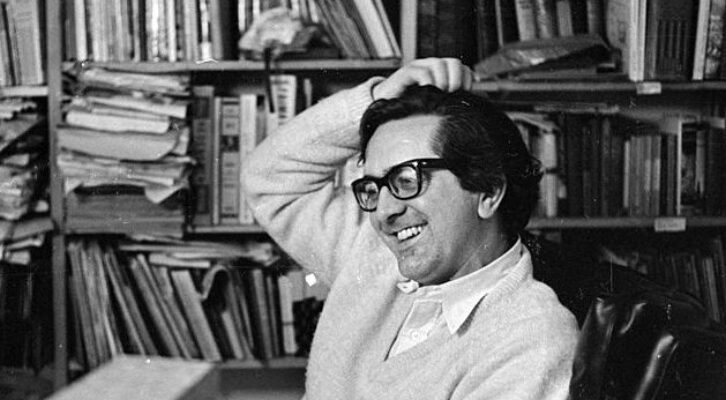Sara Gran’s books are mysteries about mysteries. They insist that we won’t or can’t see what’s right in front of us; they take the ideas of clues and cases and turn them into existential dilemmas. They are more like philosophy than crime fiction, though it is through crime—or more precisely, through mysteries—that Gran’s characters, especially her detective, Claire DeWitt, grapple with truths about life and our rightful place in the world. When DeWitt takes a case she’s not merely making a promise to solve a mystery. She’s jumping into an unknown world where the stuff of that mystery lives and trying to find her way back to familiar territory.
In the third of Gran’s Claire DeWitt books, The Infinite Blacktop, we see DeWitt delve deeper into mysteries she’s been trying to solve for years, as well as taking on a couple of new cases. In the primary case in the book, The Case of the Infinite Blacktop, DeWitt searches for the person who tried to kill her in a car accident in Oakland, California. As a character, DeWitt is alternately full of bluster and a complete mess. Prone to excessive drinking, cocaine use, and popping pills (which she steals from everyone whose medicine cabinet she has access to), DeWitt is a brilliant fuckup, an extraordinary detective with a long menu of issues. In recounting her history, DeWitt communicates both her skill and her penchant for getting into trouble:
“Since I’d left Brooklyn I’d been traveling around the country, taking it in a little bit at a time. A year in Chicago. Six months in Miami. Two years in Portland. I went from place to place, earning money when it was easy and acquiring it by other means when it wasn’t. Sometimes I solved crimes, helping out other detectives when they needed it, going undercover where they couldn’t. I was getting a reputation as a good detective but impossible to deal with. I had a temper. I had no patience. I’d shot four people. I’d killed two. None were in self-defense.”
In each of Gran’s books DeWitt is living in a different city, and they all flash back to her childhood in Brooklyn. In the first, Claire DeWitt and the City of the Dead, she’s in post-Katrina New Orleans, trying to solve the Case of the Green Parrot, the murder of a socialite district attorney. In the next book, Claire DeWitt and the Bohemian Highway, she’s in the San Francisco Bay Area, working on the murder of an ex-boyfriend. The Infinite Blacktop jumps around from Claire’s Brooklyn roots to the present in northern California and then to L.A., where she worked on a missing persons case, the Mystery of the CBSIS, in 1999, which is the case that earned her a PI license.
DeWitt alternates between boastful and abject throughout the books as she expounds on her philosophy of solving mysteries:
“I believe that someday, perhaps many lifetimes from now, all will be explained, and all mysteries will be solved. All knowledge will be free for the taking, including the biggest mystery of all—who we really are. But for now, each detective, alone in the woods, must take her clues, and solve her mysteries for herself.”
In Blacktop, DeWitt comes close to giving up:
“Fuck mysteries. Fuck clues and suspects and victims. Fuck being the best detective in the world. I was done with hope and done with goals and aims and doing and becoming. I was done with it all. Let someone else solve the mysteries. Let someone else pick up the pieces. Let someone else try to make it all fit together.”
Spoiler: she doesn’t give up. She can’t. She’s a full-blown detective. Solving mysteries is not just her occupation. It’s her life and has been since she was a teenager.
What turned a teenaged DeWitt into a detective? It was the strange appearance of a book called Détection, written by a Frenchman named Jacques Silette. We learn about Silette’s life and work in all of the books, and they infuse Gran’s narratives with the sense of mystery being more abstract than clues and cases. Along with her two best friends, Kelly and Tracy, DeWitt inexplicably finds a copy of the book in her rambling Brooklyn house:
“[There was] A copy of Silette’s Détection, sitting on the tray of the dumbwaiter, waiting for us. Three years later Tracy disappeared. Kelly and I were the last people we knew of to see her, alive or dead. No one saw Tracy or heard from her again. Wherever she went, whatever happened to her, she took our copy of Détection with her.”
Tracy’s disappearance shapes DeWitt’s life: it is the case that haunts her through all of the books. But also running through all of the books is the philosophy of Silette, which both guides and frustrates DeWitt in solving her mysteries. Silette’s life and his ongoing is also a leitmotif in the series:
“Silette wrote one book, Détection, in 1959. Jacques Silette was a genius. So I thought. So a few thousand others around the world thought too. Most people thought he was a liar or an idiot or a fraud or had never heard of him at all. I could forgive the people who’d never heard of him. I wasn’t sure about the rest. Silette’s own history was murky. He wasn’t especially secretive, just bored by things he already knew. He spent nearly all of his life in Paris. He was born sometime between 1900 and 1910 and became a detective sometime between 1930 and 1940. What is known is that by 1945 he’d solved the famous robbery of the Banque Française and recovered the rarer-than-rare first edition of Vidocq’s memoir that had been missing since 1929. We American dicks have it easy, with dozens of murders a day to choose from. The French have to settle for book heists and bank robberies.”
And these observations from throughout the series:
“Détection was maddening. The book is notoriously difficult—sometimes nonsensical, always contradictory, repeating the bad news and never repeating the good, never telling you what you want to hear, always just out of reach. That was how I knew it was true.
“Once you’ve read Silette there’s no going back, people say. Something in you is changed, and you won’t be your old self ever again. No matter how you may want to forget what you’ve read, you never can. Once you know the truth, there are no second chances. No do-overs, no changing your mind, no turning back. The door shuts behind you, and locks.”
“Like all true things, Détection would change you forever if you weren’t careful—if you didn’t hold it at arm’s length, reading with one eye on the page and the other on your friends, laughing a smug little laugh at the ridiculousness of it all. If you gave the book even a little bit of an honest shake, it would give you an entirely new life—and burn your old, better, safer life to the ground.”
Reading Silette (which is reading Gran) is like reading E.M. Cioran or W.G. Sebald: the prose is so slippery and epigrammatic one is unsure of exactly what each passage means. It’s in the individual interpretation of the text each detective imposes on Silette’s words that offers up its possible meaning.
In Blacktop, DeWitt tells us how Silette wrote his masterwork in 1956. He gained a following and assembled a group of protégés to further and carry on his work, which reminds me of Freud and his followers: Silette taught a number of students, who then take on their own students and impart their own interpretations to his work, and thus the lineage continues and evolves. He also warned against taking his work too literally: “If life gave you answers outright,” Silette wrote, “they would be meaningless. Each detective must take her clues and solve her mysteries for herself. No one can solve your mystery for you; a book cannot tell you the way.” Yet DeWitt clings to Silette’s words and his ideas. They are the only ways she knows how to solve mysteries, though they are often indirect and maddeningly obtuse. Gran repeats this idea from Silette’s book several times in the course of DeWitt’s adventures: “The client already knows the solution to his mystery. But he doesn’t want to know. He doesn’t hire a detective to solve his mystery. He hires a detective to prove that his mystery can’t be solved. This applies equally, of course, to the detective herself.”
The detective who directly taught DeWitt Silette’s methods was his star student, Constance Darling. DeWitt says of Darling: “Of course I knew who she was: the famous detective, the student of Silette, the eccentric from New Orleans, admired by some, reviled by more. Silette and his followers have never been the most popular detectives.” Darling learned from Silette, taught DeWitt and several others; in turn, DeWitt takes on her own informal students, a young man named Andray she meets during the Case of the Green Parrot, and her present assistant, a grad student named Claude. Both also have their run-ins with the mysterious Détection: in Gran’s universe, the book appears when a potential detective is ready to grapple with it.
But detectives are born in this world, not just made: “Constance was a detective since the day she was born. I like to think I was too, even though I had a long, bumpy road between my first bottle of fingerprint dust and my PI union card. But then again, so have most of us.” Constance was murdered before the time of the books starts. DeWitt says: “The big conspiracy that killed Constance wasn’t the Federal Reserve or the Octopus or the Anti-Silettians. It was the biggest, oldest conspiracy in the world—the conspiracy that produced kids like the two who shot her for pocket change. It was the conspiracy that began when the first man looked at his neighbor and said, ‘Hey, I think I’d like that cave.’” Sometimes mysteries are not very hard to solve at all.
DeWitt mourns her mentor as she wonders if she is really capable of training others: “I’d had Constance, sober, wise, and in her own way loving and pure, to guide me to dry land. Andray had me, Claire DeWitt, who despite being the very best detective in the world was at this moment snorting a crushed painkiller off her kitchen counter.” Through Constance DeWitt learns how to use Silette, and also more about his backstory. He gave up on detective work and life when his daughter disappeared:
“Jacques Silette was the best detective the world had ever seen. So I thought. His methods were unusual, but I and a few others were loyal to them. I’d never met Silette—he’d died in 1980, when I was still a child, heartbroken after his daughter, Belle, was kidnapped and never seen again…Silette never solved his own greatest mystery. He never found the smallest clue, not the hint of a solution. The great detective went on, but not for long. By 1980 he too was dead, his heart broken, chipped away from every direction—daughter gone, wife gone, work practically forgotten by the few who had ever remembered to begin with.”
“All these fucking missing girls,” Silette, bitter and old, wrote to Constance, “and the one I can’t find is my own. If it were a detective novel it would be too utterly stupid to read.”
Yet DeWitt has obvious pride in being a Silettian:
There were only a few of us Silettians and we did get more than our share of negative attention. Our enemies said it was because we were strange and unreliable, theatrical in our methods, dramatic in our solutions…I said it was because we solved so many fucking cases. And usually by the time a Silettian got his hands on a case, ten other detectives had already failed. Most cases never even got to a Silettian unless the client was desperate enough, the way a person with cancer goes to an herbal clinic in Tijuana when the doctors tell her she’s got no chance.
Such is the situation with DeWitt’s missing childhood friend, Tracy, which spurs her on in all of the books, especially Blacktop. It’s the central mystery of her life. But DeWitt also struggles with her ambivalence about Tracy’s case, and the life she’s chosen, or that has been chosen for her:
“Maybe I didn’t really want to know. Maybe, like everyone who hires a detective, I didn’t want to solve my own mystery.
“Maybe I wanted to keep Tracy as she was, blond hair and bangs, vintage dress and Doc Martens, smelling like subway and cigarettes. Maybe even detectives don’t want to solve their own crimes. Because once a crime is solved, you have to close the case and move on.
“Maybe out of everything I thought I knew, there was nothing I was more wrong about than my own life story.”
Read the Claire DeWitt series if you’d like a smattering of philosophy mixed with a healthy dose of angst and a wicked wit. Then make your own judgment about DeWitt’s life story so far.


















